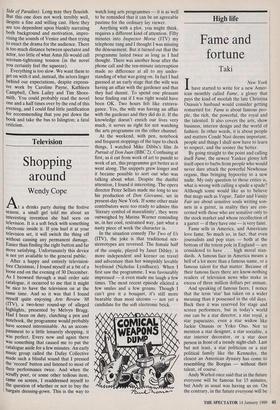Television
Shopping around
Wendy Cope
At a drinks party during the festive season, a small girl told me about an interesting invention she had seen on television. It is a soft brick with something electronic inside it. If you hurl it at your television set, it will switch the thing off without causing any permanent damage. Easier than finding the right button and far more satisfying. Unfortunately this device is not yet available to the general public.
After a happy and entirely television- free Christmas, I found myself at a bit of a loose end on the evening of 30 December. As I browsed through a mail order sale catalogue, it occurred to me that it might be nice to have the television on at the same time. And so it was that I found myself quite enjoying Arts Review '88 (ITV), a two-hour round-up of alleged highlights, presented by Melvyn Bragg. Had I been on duty, clutching a pen and notebook, the programme would probably have seemed interminable. As an accom- paniment to a little leisurely shopping, it Was perfect. Every now and again there was something that caused me to put the catalogue aside for a few minutes. An early music group called the Dufay Collective made such a blissful sound that I pressed the 'record' button and listened to most of their performance twice. And when the scruffy poet, or some other tedious item, came on screen, I readdressed myself to the question of whether or not to buy the bargain dressing-gown. This is the way to watch long arts programmes — it is as well to be reminded that it can be an agreeable pastime for the ordinary lay viewer.
Anything with a plot, you might think, requires a different kind of attention. Fifty minutes into Inspector Morse (ITV) my telephone rang and I thought I was missing the denouement. But it turned out that the programme lasted twice as long as I had thought. There was another hour after the phone call and the ten-minute interruption made no difference at all to my under- standing of what was going on. In fact I had guessed at an early stage that the wife was having an affair with the gardener and that they had dunnit. To spend one pleasant hour finding out if I was right would have been OK. Two hours felt like extrava- gance. Yes, the wife was having an affair with the gardener and they did do it. If the knowledge doesn't enrich our lives very much, it serves us right for not watching the arts programme on the other channel.
At the weekend, with pen, notebook and frequent stoppings of the tape to check things, I watched Mike Dibbs's film In Pursuit of Don Juan (BBC 2). Confusing at first, as it cut from work of art to pundit to work of art, this programme got better as it went along. The snippets grew longer and it became possible to sort out who was talking about what. Despite the dutiful attention, I found it interesting. The opera director Peter Sellars made me long to see his production of Don Giovanni, set in present-day New York. If some other male contributors were too ready to admire this `literary symbol of masculinity', they were outweighed by Marina Warner reminding us, in her cool, restrained way, just what a nasty piece of work the character is.
In the situation comedy The Two of Us (ITV), the joke is that traditional sex- stereotypes are reversed. The female half of the couple, played by Janet Dibley, is more independent and keener on travel and adventure than her wimpishly lovable boyfriend (Nicholas Lyndhurst). When I first saw the programme, I was favourably impressed — it even made me laugh a few times. The most recent episode elicited a few smiles and a few groans. Though I can't give it a bouquet, it's still more bearable than most sitcoms — not yet a candidate for the soft electronic brick.


















































 Previous page
Previous page